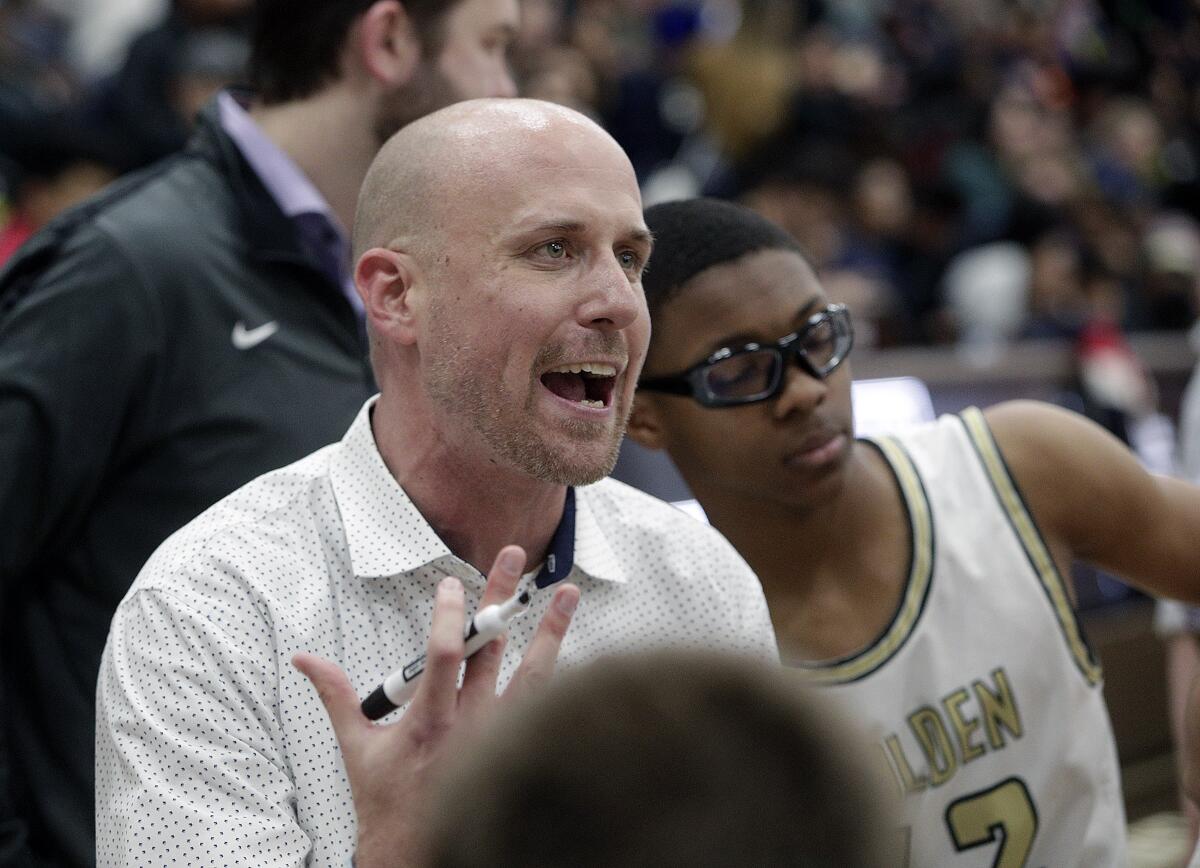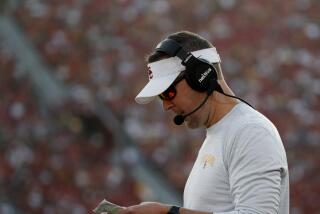No more handshakes? One coach demands sportsmanship stay

- Share via
Handshakes have been part of the postgame landscape in high school sports seemingly forever. It’s the simple, respected way winners and losers show their sportsmanship. But in the age of COVID-19, medical professionals are saying handshakes should be replaced by a safer gesture.
The executive director of the National Federation of State High School Assns., Dr. Karissa L. Niehoff, said this week in an editorial, “There will be many concessions necessary to resume athletic competition, and shaking hands is one that must cease — at least for now.”
Many coaches believe that is a reasonable request. As Sherman Oaks Notre Dame basketball coach Matt Sargeant said, “In society at large, we would be better off adopting a new sign of respect, and if high school sports is supposed to prepare kids for life outside of basketball, then teaching them other ways to show respect after the game is better for society as a whole.”
La Cañada Flintridge St. Francis basketball coach Todd Wolfson saw Niehoff’s comments about ending handshakes and objected.
We asked Wolfson to explain his reasoning for continuing to shake hands. This is what he wrote:
“This pandemic has brought sports to a screeching halt. It seems like to get back to playing sports again, we must make modifications to many things that we do on and off the field/court. One of those revisions seems to eliminate the handshake, a gesture that I was taught is the ultimate sign of respect after a sports game has concluded.
“When coaching, the safety and health of my student-athletes is the top priority. Once we are cleared to resume basketball, I am going to get back onto the court with my team. We will take extreme precautions to keep everyone safe and follow CDC, WHO and guidelines set by the NFHS. Eventually, in the near future, we are going to get cleared to play basketball games again. And once we are cleared, it is going to be extremely difficult to tell my team to not shake hands when the game is over. Shaking hands is the respect that the game deserves, and our opponent deserves. Every year, we practice how we shake hands with the other team when the game is over.
“Many may be upset and say, ‘You’re going to spread germs, your players shouldn’t do that!’
“If we are cleared to play basketball games, my team will be diving on the floor for loose balls, we will be setting screens, we will be boxing out and we will be taking charges. We will be running and sweating and standing within inches of our opponent … because that’s how basketball is played. How am I going to justify to my team to play as hard as they can and dive on the floor for a ball but not shake the opponent’s hand when the game is over? This doesn’t make much sense to me in so many ways. . . .
“In a world of celebrations after hitting three-pointers, clapping in your opponent’s face and posting your opponent falling on Twitter or Instagram, we can’t lose respect for our opponents. Watching the Chicago Bulls documentary “‘The Last Dance,’” Isiah Thomas didn’t make the USA team because he didn’t shake hands when the game was over. It was an extremely controversial decision. . . .
“If it’s not safe enough for my players to shake hands, I don’t want my players setting a screen or diving on the floor. If it’s not safe for my players to set a screen or dive on the floor, I don’t want them shaking hands. If the CDC and WHO says it’s OK to play a full-contact basketball game, then we will be shaking hands, because we will always teach respect.”
More to Read
Get our high school sports newsletter
Prep Rally is devoted to the SoCal high school sports experience, bringing you scores, stories and a behind-the-scenes look at what makes prep sports so popular.
You may occasionally receive promotional content from the Los Angeles Times.







